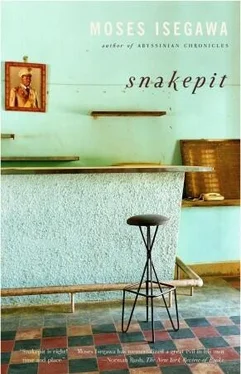“Yes, they were,” Tayari said pensively.
“Did he say what is going to happen next?”
“Nobody can, except God, I mean Dr. Ali. I decided to do it just to get it out of the way. I knew that many people were thinking about it but were afraid to take action.”
“What did Father say?”
“Under the circumstances he would kiss the man’s feet if he said that Bat was returning home tomorrow.”
“Where did you get the money?”
“From the fireworks displays. I also have other sources.”
“I am very proud of you.”
“Thank you, Sister.”
Sister did not have to do much; Tayari had taken over the show. She returned home the next morning. Mafuta had arrived the night before and was in a bad mood. They almost had a row. He wanted her to listen to his story first before burdening him with her worries. She maintained that her brother’s life was in mortal danger. He agreed but said that he had missed her and needed some attention. He had had a difficult fortnight. He had bought cattle, sold it, but the buyer had tried to cheat him. He had spent the week trying to get his money.
She knew that he was being difficult because he did not like Bat. He had gotten the news the previous night and gone out to drink. He had felt happy that his enemy had bitten the dust. Maybe now he had learned what it felt like not to be accepted. Maybe he would learn some humility, some manners, some respect, some consideration. It was only at the end of the evening, replete with beer and meat, that he had admitted that it could have happened to anybody.
It surprised him that a day later he still could not resist showing resentment to his wife. He had thought about it, planned to be nice, but when he saw her lumbering home, he felt angry. Angry that she had not been home to receive him.
“It is terrible news,” he finally conceded. “What do you want me to do?”
“Accompany me to Kampala.”
“All right,” he said grudgingly, thinking about the cost. Spending so much on a person he did not like. He did not say it out loud, but she sensed it in his tone of voice, in the way he brooded. If she hadn’t been pregnant, he would have prolonged the fight.
The atmosphere in the house and on the bus could have done with some cheer. It looked and felt grey. Everything was so different from what they were used to, for they usually enjoyed each other’s company. Maybe he missed the big meals she cooked him, the little things she slid his way. He definitely did not like competition, and was already worried that the baby might come between them and usurp his position. The little bastard might get some of Bat’s characteristics and that would be a disaster. Then he would have to doubly assert his authority.
Mafuta was irritated by having to meet Bat’s rich and more educated friends. He resented them and the way they made him feel. There was the Professor: he would be preaching and paying attention to Sister. These people did not seem to see him or did not know how to talk to him, the intruder who took their friend’s sister away from the circles she should have joined as a permanent member, by marriage to one of their colleagues. The Kalandas had the ways of the newly rich. They had subtle means of flaunting their class, little references to artists, painters, foreign places, as if saying, If you don’t know so-and-so, or this or that place, you are a peasant with grime under your nails. Such subtlety annoyed him. Mrs. Kalanda had her sisters in Kenya and in Britain and the things they sent her. He had heard it all before at his wedding; he knew he was going to hear it again, swaddled in new words or shamelessly displayed in the old ones. These days it seemed that the quickest way to rise in status or class was to go abroad; the interesting thing was that those left behind, family or friends, all rose with you. “I have a brother in America, a sister in Australia, they are leading such a wonderful life,” some fool would chirp boastfully at you, as if he had won the lottery or been made a minister.
Mafuta had put on his best clothes, well ironed by his wife; he had put on his best black shoes, polished to a shine with his very own hands. But Bat’s friends were probably going to be talking about Italian shoes, English clothes, as if Drapers were still on Kampala Road, as if in the bygone days everyone had access to chic shops and the goods they sold. Now he felt happy that Amin had chased the Indian and British merchants away. It has not made everybody equal, but it has removed the alluring, unattainable goods from the public’s eye, and whoever wants them has to take the trouble to go to London, which most people can’t afford to do, Mafuta thought with some satisfaction. The soldiers are in power, flaunting their wealth, but it is transient and they lack style, which makes few jealous of them.
Mafuta had grown up with no materialistic instincts, and he still did not care very much, but when in good company he did not want to feel locked out. It made his bulk feel cumbersome, like a heap of stones, with his heart palpitating inside like a fisted frog. It seemed he had been too optimistic in going into old-fashioned town-planning in the fifties, when it looked as if the country was going to expand its modern tentacles aggressively. But then again, he hadn’t had the grades for medicine or economics. Why was he brooding over spilt milk? Because some Cambridge-educated bastard had refused to accept him? Because he did not fit in with the bastard’s friends? Because he sold cattle?
Brooding at such a time seemed ridiculous. He felt a little bit guilty. He wondered why it never bothered his wife that she did not know some of the things the Kalandas went on about. They had accepted her because of her brother. They even felt protective of her.
“We are going first to the Kalandas. .” his wife was saying.
“I know,” he said rather loudly, with a touch of unfriendliness.
The city looked hospitable when he had money to milk from it, cows to offload at a profit. Now it looked desolate, as if half its occupants had died, as if the remnants were combatting ghoulish fevers. Soldiers were joyriding down the streets in open Stinger jeeps, guns and bums sticking out. State Research Bureau boys were prominently displaying bell-bottom trousers wide as tents, platform shoes high as ladders, silver sunglasses shiny as chrome and walkie-talkies bulky as phone booths. Looking at them, spectral as scorched trees and menacing as bee-stung bulldogs, one might get the impression that an arrest was taking place every minute, the country locked in a spastic daze. They made this look like another city, compared with the earlier Kampala— accursed, dirty, haunted.
In the villages where he had just been, these boys were absent. Cattle farmers went about their business seemingly oblivious to the crisis in the city. Stepping from the horizon-kissed grasslands into urban filth, violence, uncertainty, was to step into a broken, alien world. But they were two thinly joined worlds, flying the same flag, using the same inflated currency, ruled by the same scum. To most villagers Marshal Amin was a spectre floating on rumour, occasionally projecting from a feeble radio speaker, never seen, never touched. Mafuta started feeling that he had made the right decision. Living in this atmosphere was not conducive to one’s health, sanity, equilibrium. How he now itched to go back to the cattle trail, where a heap of dung meant that cows were in the vicinity. Here they were in the city, chasing a trail of human dung, but without the certainty that there was a human being, living or dead, at the end of it.
The stay at the Kalandas’ was as agonizing as he had imagined. The two women went off to another room and talked for ages. He studied the pictures on the wall, the furniture, the trees outside, till he gave up. Meanwhile, Mr. Kalanda arrived and they struck up a conversation. There were no new developments. Contacts had been made far and wide, but nobody seemed to have seen Bat on the fateful day or afterwards. There was a conspiracy of silence at the ministry, which nobody had managed to crack. The car had been sighted at the Nile Perch Hotel, but the police were holding it as evidence.
Читать дальше











